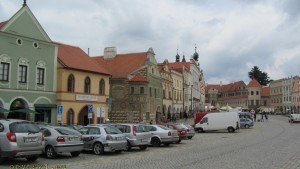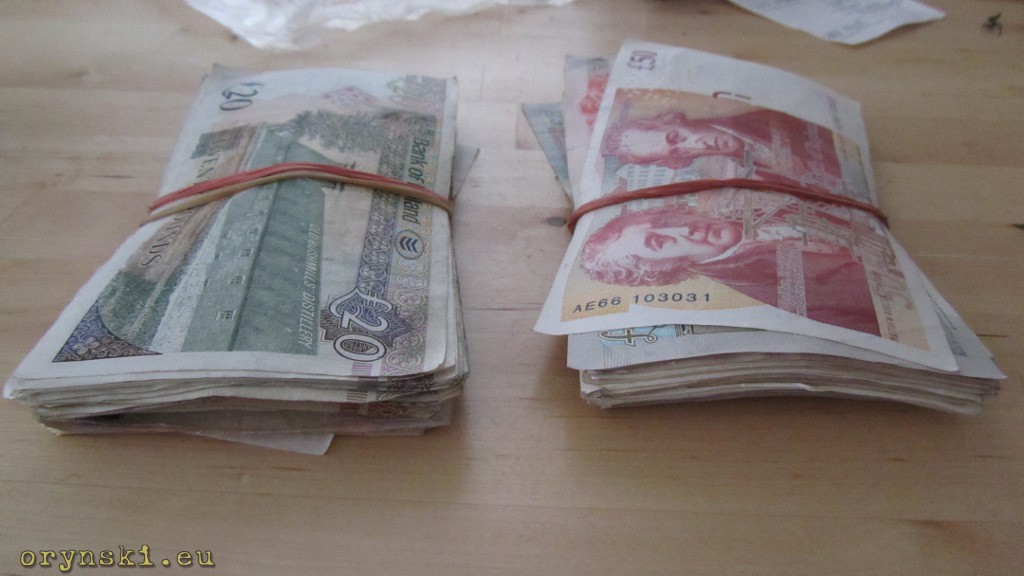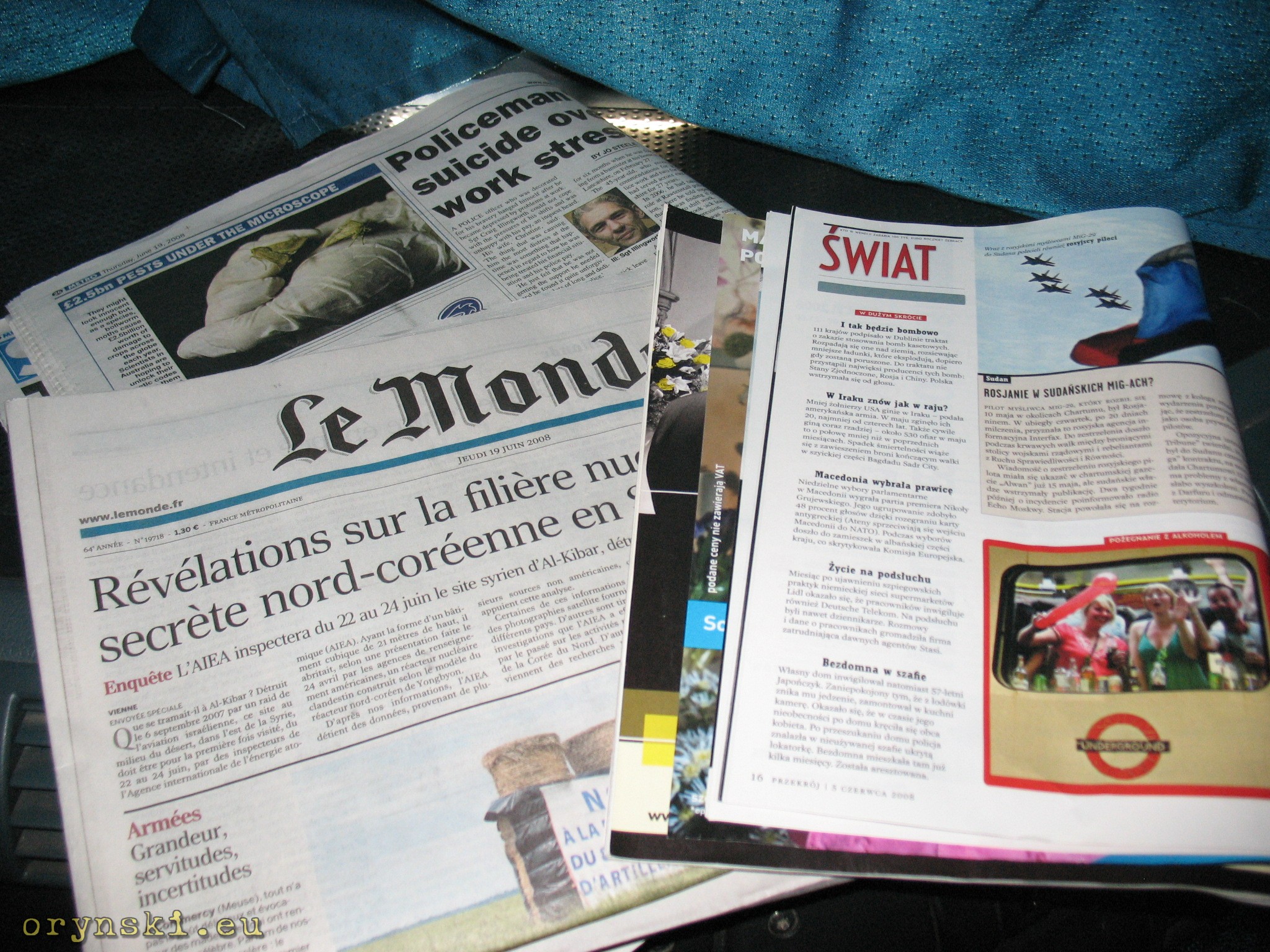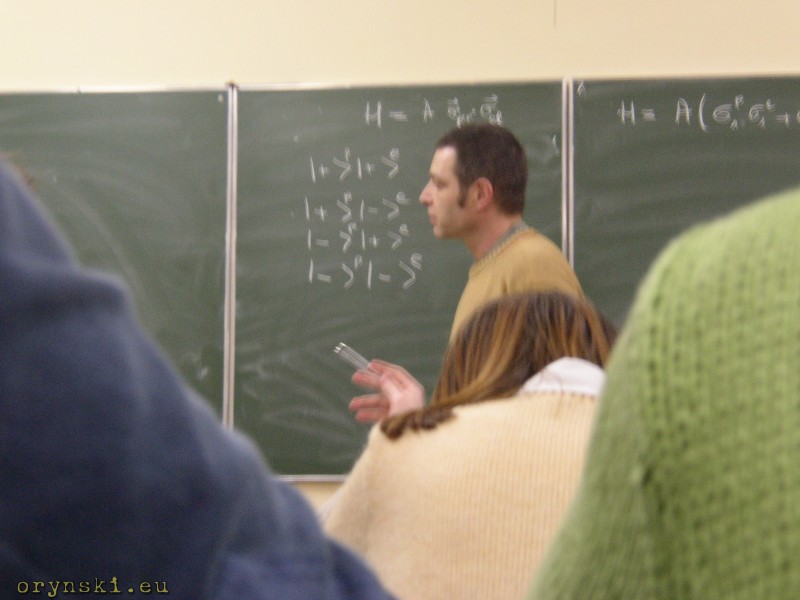Translated by Craig Proctor
Although at the beginning of his government Polish prime minister Donald Tusk claimed thanks to his polices, soon Poles would be returning home from Ireland and UK en mass. So far this has not happened. Donald Tusk himself lowered the tone and no longer mentions the subject. Yet a growing number of people, including Western Europeans, chooses Eastern Europe as a place to live. I asked a few of them what were their experiences and if they are happy with their choice.
 Meet Dave, an Englishman, who one day decided to sell up his business and enjoy his well deserved retirement in a sunnier corner of the world. As chance would have it, he saw a Bulgarian house on e-bay and decided to bid on it after a bit of reading about the country.
Meet Dave, an Englishman, who one day decided to sell up his business and enjoy his well deserved retirement in a sunnier corner of the world. As chance would have it, he saw a Bulgarian house on e-bay and decided to bid on it after a bit of reading about the country.
Another Briton, Andy, ended up in Eastern Europe via a different path. One sunny day, dazed by the beautiful summer weather, he decided that moving to a small village near Częstochowa and helping his girlfriend (today wife) build a house was not that bad idea.
It was also a calling from the heart that lead Barış, a Turk who met his future Polish wife in Great Britain, to Poland
It turns out that Eastern Europe is also a destination for migrant workers. That was the case for Giuseppe, who decided to look for work in Prague. Although he wanted to stress that Czechs are very sensitive about Prague being classed as Eastern Europe. According to them Prague is not Eastern Europe – it is the very heart of it. “And they have a point – if you look at the map, Prague is more West than my native town in Southern Italy” – added Giuseppe.
For Svetlana, there is no doubt that Kraków, where she has lived for nearly 20 years, is West of her birthplace. She moved there from Russia as a teenager to study.
Another person who agreed to share their opinion with us was Paulina, a Canadian of Polish descent, who for some time lived in Warsaw.
And because serious research can not be done without a control group, the last member of my private panel of experts is Jarek, whom I met after moving to Scotland, and who, after many years, returned to Szczecin, Poland, where he is starting his own business.
To start with, I asked if life in their new country was what they had expected it to be, and how reality compared to popular beliefs about Eastern Europe in their home countries. The myths are very strong. As Dave recalls: “We were warned of the Mafia having control of Bulgaria, crime being rife, not to trust anyone etc, and that was before we left the UK”. But the reality proved to be different. When asked about the Mafia, Dave’s Bulgarian friends pointed out politicians (but are they not in all countries?), the rumours about omnipresent corruption turned out to be completely false, and when it comes to criminal activities, Dave witnessed only one after which “the culprit and his family were shamed into leaving the village. The youths crime? He stole a chicken”.
Dave seems to be really impressed with Bulgarians’ honesty. “When my friend dropped his wallet in the town, a Bulgarian chased after him to return it, complete with his cash and all his credit and bank cards. You wouldn’t see that in UK”.
Dave felt so welcomed in Bulgaria that after a two week holiday there he decided to sell up his business in the UK and move with his wife to Bulgaria permanently.

For Andy moving to Poland seemed a like a dive in at the deep end. He had lived in Denmark for a while, and in his eyes that was a country where it was easy to live. “People are relaxed, they don’t need to work too hard to enjoy life. Social relations and family ties are still strong…” On that backdrop Poland seemed a more chaotic country. The relation between earnings and costs of living is quite unfavourable: “I have found it very expensive to be a local. For example my Polish built computer monitor was much cheaper to buy in the UK than in Poland. I doubt it would be possible for a UK family to move here and get by. It requires more hard work and less creature comforts.” he said. Andy was visiting Poland regularly for many years and he witnessed a lot of changes “Sometimes for better, sometimes for worse”. He hopes the things he values most wont change. “I find village life very appealing. Communities in the UK have largely been wiped out by governments, the need to move in search of work and culture, and moving homes. Here generations appear to have stayed in the same spot and that feeling of togetherness and helping those around is very strong, this appeals to me greatly. I find Polish people the main plus to being here. They have very strong tradition, respect between generations and there are many occasions when people in the village have to get together to sort out a problem and deal with it themselves. Maybe it’s different in the towns and cities. I like the town markets, small shops and a few of the large old style shopping malls. But now I see many more new impressive cathedrals to retail being built. The slide to the West has begun “I need stuff”. I think in my lifetime village life will keep it at bay.” The biggest surprise for Andy was the beauty of the countryside. “I always thought its cold and grey here. Summer was a revelation. But the city centres can be grey concrete places, however the countryside is stunning. I enjoy driving here and try to take A roads and not motorways. I love driving through villages, towns, forests at a speed I cannot enjoy in the UK and then stop at the numerous restaurants and get great food. The food was surprising, in the UK they say the Poles eat very bad food, but I love it. A lot of history, some of it very recent. I find Poland an interesting country, lots to explore. I find the food and culture very fine, even the religious side, I haven’t seen anything quite as stunning as All Saints Day. I am very happy travelling around, but a major attraction for me is that, apart from the MacDonalds and KFC’s, it’s still feels alien and strange to a Westerner”.
For Barış the biggest surprises were the cultural differences. “First of all, Polish girls are so articulate” – laughs his wife – “but also resourceful. He was astonished that we always plan everything two steps ahead, while Turks just live the moment. For them, there aren’t any problems that can’t be settled with a bribe. They find it strange that the same can’t be done in Poland. The phrases “it can’t be done” and “it is illegal” are the most hated Polish phrases for them.
Svetlana’s situation was quite different: she found herself in Poland “pushed” there by her parents, who seen no future for their daughter in Yeltsin’s Russia. Although she felt a bit ashamed amongst her peers that she is not going to a “real foreign country” (as the old Russian saying goes that “a chicken is not a bird, Poland is not abroad”). She had a chance to visit not only Poland but also Western Germany before, so while she saw the difference between Poland and Russia, she was also aware how big gap was between Poland and the West. At the beginning she was mainly learning to live on her own – as at the age of 17 living far away from her family was not an easy task, but after some time, she started to realise how exceptional her situation was and that she was lucky to live in Poland because it was more comfortable and easier to study at a Polish University, but everyday life was simpler too. For Poles, who constantly complain about their fellow-countrymen, her good opinion of Polish drivers, clean streets or everyday politeness, might come as a shock. But she is very firm on that, “Your problems with potholes on the road or drunk drivers are nothing compared to what is going on in Russia”.

Guiseppe lived in various countries such as France and Spain, but now he has settled in the Czech Republic. Life in Prague has not brought any surprises Giuseppe’s way, but he does have one complaint. “Pizza. It’s everywhere and it’s amazing that no one in the whole former Czechoslovakia is able to prepare a decent pizza. I mean, it’s not difficult at all, it’s amazing the way they’re able to make shit out of it. And when they ask me if I want some ketchup on it, I feel like crying.” But just as Andy, the Italian is afraid that Capitalism will destroy what he likes most in his new country, the cultural life. Prague has a lot to offer, but he most likes the heritage and local museums spread across the country: “Every single village has its own museum about something, even ridiculously little ones. But I love it. It’s something that the new market economy will destroy soon, because it’s obviously not profitable for the state to pay old ladies to hand out tickets for less than a euro to not more than a dozen visitors per week. I’m afraid these particular village museums will simply close when these old ladies will finish their lives.”
Jarek also liked Prague, but he decided to swap it for a Polish town Szczecin. Since we cruised together on the British motorways in our trucks, he travelled around the world and finally landed in Prague. But he still had a feeling that it’s Poland where his home is, so when the situation arose he moved with his partner into his granddad’s flat. Their idea for living was to open a cafe on wheels. “The idea came from Germany – I saw a cafe set up in an old VW Camper in Rostock and that was where I drew the idea from, but then after I got deeper into the subject, it turned out that it would be much better to do it on a bicycle”. And although you might think that the weather would be the biggest worry for a cycling barista, it was the bureaucracy that caused most problems. “I wanted to start in May or June, but there were still some problems – Sanitary Inspectorate, missing this, missing that… Finally when it seemed that everything was ready, I got stuck: Polish law was not prepared for someone selling coffee from a rickshaw. I was surprised by their unwillingness to solve the problems in my favour – after all the law does not say that it’s illegal, so they just could say ‘yes’ from the beginning. But then it would mean, that they are there for us” – recalls Jarek – „Of course, not all officials are like that – many tried to help us, but the whole system of bureaucratic thinking was visible – non stop they were saying “we can agree to that, but what would X, Y, Z say to it” where XYZ were the whole list of another offices, departments and institutions. And if they say ‘No’, they have peace of mind, and if they agree, there might be some troubles, someone might say they were bribed to pass it trough etc.”
It was only widespread support of Szczecin people and massive action on Facebook that pushed the bureaucrats to give their approval. And if it wasn’t easy for Jarek, born and bred in Poland, how hard would it be for a foreigner?
“To deal with everyday life you need a Pole nearby to help you. I need my wife to navigate me around the government buildings. I tried to open a business here, that was a paperwork nightmare of epic proportions and ZUS (National insurance) is the evil of all evils. Another example of life just being harder, is how expensive and time consuming it is to run a company here. I think anything to do with a government office would set any Westerner into a state of utter frustration. Anything to do with paperwork will seem utterly futile and a tortuous waste of time. I am back in the UK at the moment as with a business. It’s much easier, so I just live here.”
For Barışa when it comes to running a business, Poland is Africa, and closer to Somalia than to Botswana. “With any errand, you have to visit every office several times, and still cant’ be sure that you’ll succeed”. The bureaucratic labyrinth is incomprehensible to a foreigner „How it is, that tax for an imported car cannot be paid in the nearest Tax office, but you have to go to another town, yet the local Tax office has no problems in accepting payment from the unaware foreigner and then refuses to give it back?” Barış, just like Andy, misses the ease of running a business in the UK, but he has not given up and is just opening his second Kebab shop.
Svetlana is not a businesswoman, but it is not easy for her as well. Despite living in Poland nearly 20 years, until recently she had to still go through the same bureaucratic hell every year – first, together with ther employer, she had to obtain a work permit, and then on that basis apply for a temporary resident permit…
It seems that Poland has a place in the bureaucratic Hall of Glory, as for Dave, although he admits, that Bulgaria is a bureaucrat’s country, he describes his dealings with paperwork as “silly little annoying things”. For Giuseppe, Czech bureaucracy does not seem to be worth mentioning at all. Paulina tries to provide the explanation of that situation. For her, bureaucracy is one of the main problems affecting life in Poland. She also points out some other, often related, phenomenons: “Here you face burdens at every step – no matter if you have something to sort out in an office, or if you just want to travel from A to B. Polish tolerance of all kinds of fraud is annoying”. According to Paulina, the reason for this is Poland’s strong dependence on foreign capital, either from the EU or private businesses. As a result many try to take as much as they can. “I think foreign capital has the same effect wherever it is found” – says Paulina. – “Additionally in Poland there is a culture of ‘If they give, you take’, and a complete lack of sense of community – let’s look for example at all the fancy cars on the roads that are falling apart, as the contractors steal the building material and sell them on the black market, and their supervisors are interested only in making money for themselves. As a result poor Kowalski, who drive his battered Fiat slaloming between potholes looks with jealousy at the luxury life that the road workers lead.. But he does not condemn their behaviour, he does not reports the cases of theft and frauds, but thinks “I would like to have such a fancy home as well… What fraud can I do to make money?” This is the real catastrophe, in my opinion. And in the meantime, the Poles are dealing with nonsense like the question of the cross outside the presidential palace”

Another problem can be the language barrier. Svetlana, a graduate in Polish Studies, is an exception, as she speaks better Polish than many Poles. Giuseppe has been learning Czech for two years, but he still does not consider himself communicative “I believe it’s 50% my fault and 50% the fault of impossible Slavic languages” he laughs. Dave’s only language, befroe moving to Bulgaria, was English. He is making progress with Bulgarian and tries to have a chat with his neighbours whenever possible: “sometimes using pencil and paper if need be to draw diagrams of what we are discussing which adds to the fun factor, but we always manage to have a laugh and enjoy our chats. We do have people in the village who speak English and are more than happy to translate if its something important like having to complete forms or seek specialist advice etc” – says Dave. Andy is also far from being fluent in Polish “I can go shopping and eat in a restaurant and be mostly understood. My excuses are normally “I am not in Poland full time, always away working” Things are easier for Barış, who in his Kebab restaurant has constant contact with their customers.
But it is not the language that is the main factor when it comes to quality of life. Svetlana who speaks perfect Polish considers going back home: “The situation in Russia, especially economical, has changed. The salaries are about the same, especially compared to the costs of living, people are starting to travel abroad etc. At the same time I miss my family. I have really strong ties with them. It takes three days on the train to get to them. And beside, as I grow older, I realise, how many thing have happened in Russia and being away I missed them. It might be my last chance to try to keep up with them”.
Jarek is happy with his decission about returning to Poland. But he values highly experiences he gained during his travels “People in Poland, and especially in Szczecin, long for something new. And it is also important that it is not the student working for peanuts who don’t care if customers are happy. I work myself, I can chat with everyone, I am trying to be up to date with what is going on in the town. This is where my travels come in handy, as it is only Poland where the owner of restaurants or bars is never in and bartender or waiter are just a junk jobs. So what is supposed to draw people in? Beer or coffee is not enough, time that the employee was the basis for business. I learned it, amongst other things, in Glasgow. And my business is going forward”. Also Barış succeeded in that area – together with his wife, they are just opening their second restaurant. Although he misses both Turkey and London, his roots are growing deeper and deeper.
Dave also does not want to go back to his country. “It really bugs me about how the press in the UK try to incite hatred towards the Bulgarians, they are very well educated, hard working kind people, I would recommend Bulgaria to anyone wanting to relocate to a new country”. He admits though, that Bulgaria has its problems: “due to the economic situation in Europe, the young are leaving in their droves to look elsewhere for work, as the elderly die the homes become empty and fall into disrepair, it’s really sad to see villages dying a death. Without investment into the Country from businesses this is going to get worse over the coming years. This is probably why when we moved here, we were greeted in the village as if we were some sort of Saviours, after almost three years here I’m now like part of the fixtures and fittings and treat the same as any Bulgarian. I feel like I belong here and dread the thought of having to return to live in the UK if circumstances change”
If Paulina is sure about something, it is that Poland is not her place in the world. Today she lives in Canada and she enjoys a peaceful life. “The state of the roads, complications with the simplest errand, impertinence of the Catholic clergy, the appalling lack of public dialogue – never ending rows over absurdly stupid things when really important things concerning average people are ignored, apart from this splashy demonstration of wealth, subjectification of woman, male chauvinism, omnipresent pornography” – she never could come to terms with any of these things. “Finally I decided, that I would prefer to stay a Canadian of Polish descent”.
Andy still has some doubts. For him his life in Poland proved to be less ideal then he thought at the beginning. At times he goes for the walk. „Visit my uncle ten houses away and sit in his simple kitchen were he sleeps with his wife in winter as its the only place were it is warm, they get water from a well, i would say they have a hard life, but he is always smiling, this cheers me up, or I can just walk into the forest for a few hours, then I know why I am still here.”
Some names have been changed
Article published in www.gazetae.com





